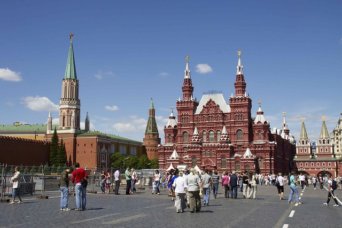- About
- Topics
- Picks
- Audio
- Story
- In-Depth
- Opinion
- News
- Donate
- Signup for our newsletterOur Editors' Best Picks.Send
Read, Debate: Engage.
| topic: | Good Governance |
|---|---|
| located: | Russia |
| editor: | Igor Serebryany |
The scale of fear and social anxiety has been on a swift rise over the past three years in Russia, reaching a scale not seen since the collapse of the Soviet Union, a recent poll conducted by the Levada analytical centre shows. The list of fears discovered by the Levada sociologists includes the threat of diseases, unemployment, poverty, wars, crime, ethnic conflicts, natural disasters, political repressions as well as such rare mishaps like "God's wrath" or "the authorities' plans to introduce mandatory biometry in the country" as outlined by the report.
A previous similar survey was conducted by the Levada in 2016. Compared to this the fastest growth in the same list of fears has been detected among those afraid of political repressions. The number of Russians expecting to become victims of the authorities' arbitrariness of whatever kind jumped three-fold since 2016. The number of respondents afraid of a domestic armed conflict or a large-scale war grew up by 150 percent. 51 percent of Russians live in fear of a "looming" war alone, while 27 percent are uneasy with the prospect of being arrested or otherwise intimidated by the ruling regime. The poll did not specify what kind of war they were expecting to break out, civil or international.
The rise of anxiety is a phenomenon typical for the periods of social and political instability, which bring about various fears, both rational and irrational, professor of the social psychology in the People's Friendship University of Russia, Maxim Kiselev says. According to the scientist, while some fears could actually be a sign of mental illness, the anxiety over wars or abuse from the authorities is, on the opposite, a trait of people who assess the current situation adequately and are generally immune to the Kremlin propaganda. "Those fears are absolutely rational and, as such, have been a very precise indicator of the objective state of affairs in this country. I would even say, the more realistically a person is thinking, the more he or she must be anxious over those developments," Kiselev says.
Even such clearly peculiar phobias like the expectation of a looming Doomsday (and the likes) are a perfect indicator of the growing tension and instability in the Russian society, he adds. "Social stress usually triggers fears normally hidden deep inside the humans' heads". On the other hand, the people who have said, they "were afraid of nothing" (the Levada Center found 4 percent of them among those polled, compared to 12 percent in 2016) are either showing off or not quite adequate themselves, Kiselev assumes.
"Optimism against all odds" is typical for certain groups of the population, social psychologist Alexei Roshchin explains. "In every country in all times there are people who believe that whatever the authorities are doing they do it for the people's good. That was especially true for the Soviet propaganda, which used to justify the lack of political freedoms and never-ending economic troubles with the universal justification: this is for the sake of peace", he reminds.
Image: Martha de Jong-Lantink, flickr
